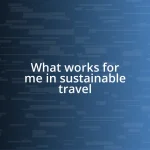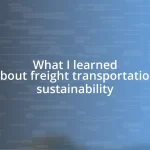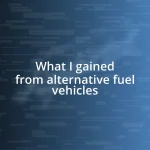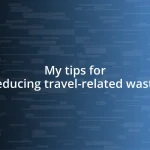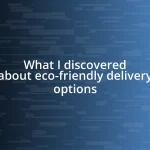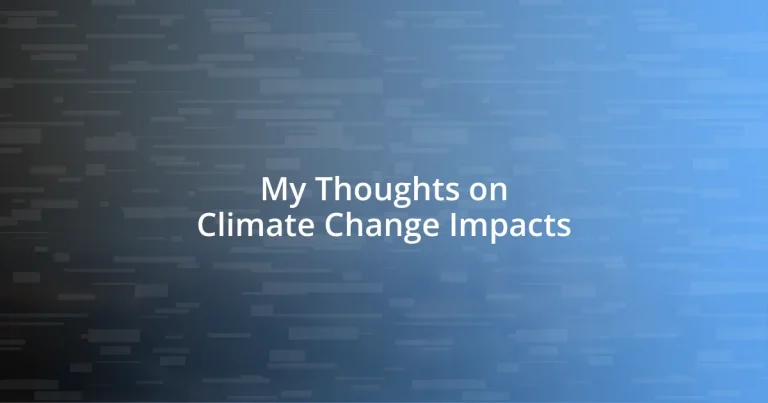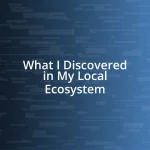Key takeaways:
- Personal experiences reveal emotional and physical impacts of climate change, including altered landscapes, wildlife behavior, and health risks.
- Economic consequences are significant, affecting livelihoods, sustainability of farming investments, and exacerbating inequality in marginalized communities.
- Advocacy and personal action are crucial; collective efforts, policy changes, and individual lifestyle choices can foster meaningful change in combating climate change.

Understanding climate change impacts
Climate change impacts are vast and often deeply personal. I remember visiting my childhood home after a summer that felt unusually intense, with sweltering heat and unexpected wildfires nearby. It made me wonder: how often do we truly consider the direct effects of rising temperatures on our lives?
As I look out at my local coastline, the changes are painfully clear. Higher tides and beach erosion have transformed familiar landscapes into memories of what once was. Have you noticed similar shifts in your environment? It’s hard not to feel a sense of loss when places that once brought joy begin to disappear or change beyond recognition.
Additionally, observing shifts in wildlife has been striking for me. Bird migration patterns have altered, and where nature once felt predictable, there’s now an eerie unpredictability. It raises a question: how do we adapt to a world that feels increasingly out of balance? Reflecting on these experiences, I realize that understanding climate change isn’t just an academic exercise; it’s a vital part of our emotional and collective reality.

Observing local environmental changes
There’s something surreal about witnessing environmental changes unfold right before your eyes. Just last autumn, I took a walk through a once-thriving forest spot where I often played as a child. I was struck to find that many trees had succumbed to disease, likely exacerbated by the increasing humidity and shifting temperatures. It felt like a chapter from my childhood had been erased, replaced by a stark and unsettling silence.
Here are some specific changes I’ve noticed in my local environment:
- Shifting Seasons: Spring seems to arrive earlier now, with flowers blooming weeks ahead of their usual schedule, which alters local ecosystems.
- Water Levels: Lakes and rivers in my area are both fluctuating more dramatically; some days they seem unusually low in drought, while on others, heavy rains flood nearby roads.
- Wildlife Behavior: I’ve observed deer roaming closer to urban areas, likely in search of food as their natural habitats become less stable.
- Pollinator Decline: The bee populations around my garden have noticeably diminished, affecting not just plant life but my own gardening efforts as well.
These local changes resonate deeply, serving as a reminder of just how intricately our lives are interconnected with the environment. It’s hard not to feel a mix of concern and wonder as I witness these shifts unfold.

Assessing impacts on ecosystems
Assessing the impacts on ecosystems has become increasingly important to me, especially after experiencing firsthand the profound effects of climate change in my community. I recall a fishing trip with my grandfather where we would cast our lines into a local lake teeming with fish. Recently, I returned to that same spot only to find the water quality diminished. The fish populations have plummeted, and it saddened me to think about how our shared moments have changed with the ecosystem’s decline.
Over the years, I’ve also noticed that local bird species I cherish are disappearing from the skies. As a child, the joyful sounds of chirping were a staple of my mornings. Now, I rarely hear those familiar melodies anymore. This shift not only alters the natural soundscape but also affects the entire food web, disrupting relationships within the ecosystem. Can we still call it home when the wild inhabitants we once knew have vanished?
The contrasting fate of flora and fauna in my area further illustrates the critical condition of our ecosystems. I’ve watched my once vibrant garden struggle to produce the same blooms and fruits it once did, likely due to shifting pollination cycles. It makes me reflect: how do these changes resonate with our overall well-being? My concern for the natural world can’t help but stir emotions; it’s not just about losing plants or animals, but losing parts of our identity tied to these ecosystems.
| Impacts on Ecosystems | Description |
|---|---|
| Fish Populations | Decline in water quality has led to drastically reduced fish numbers, affecting local fishing traditions. |
| Bird Species | Noticeable decrease in familiar bird species, impacting local biodiversity and natural soundscapes. |
| Flora Decline | Struggling gardens and plants signify disruptions in pollination cycles, affecting food production. |

Evaluating human health consequences
As I observe the profound impacts of climate change, the health consequences for humans become increasingly evident. I remember a time when my friends and I would play outside without a care, but now, with heightened heat and air pollution, days spent outdoors feel like a calculated risk. Allergies seem to worsen every year, leading me to wonder: are we adapting or merely enduring this new normal?
The rising temperatures and fluctuating weather patterns have also contributed to a surge in vector-borne diseases. I recall a summer spent hiking where I ended up with a tick bite, a stark reminder of an ecosystem disturbed by climate change. It’s alarming to think about how diseases like Lyme disease are spreading into new areas, affecting not just my family, but communities all over. The thought of disease encroaching on our once-safe spaces is unsettling, isn’t it?
Mental health is another crucial aspect often overlooked in discussions about climate change impacts. I’ve felt a sense of grief as I watch my beloved local landscapes transform, accompanied by an uneasy tension about the future. Each change stirs a mix of anxiety and sorrow, raising a question that haunts many of us: how do we find hope when the familiar comforts of our environment are slipping away? It’s in these moments of reflection that I realize the deep connection we all share with our surroundings—one that impacts both our physical and mental well-being.

Analyzing economic implications
I’ve been really struck by the economic implications of climate change in my own life. Just the other day, I heard a local business owner lament how unpredictable weather patterns have affected his seasonal sales. It made me think: how many more families depend on consistent weather for their livelihoods? The uncertainty around climate can ripple through entire communities, impacting everything from employment to local taxes.
Moreover, I can’t help but reflect on the rising costs of adapting to these changes. I recall a conversation with a friend who’s a farmer. He talked about the significant investment he’s had to make in irrigation systems due to inconsistent rainfall. This forced adaptation has not only strained his finances but also led to questions about the sustainability of those investments in the long run. Does it make sense for farmers to adapt continuously when the climate continues to change unpredictably?
Additionally, there’s the broader concern of economic inequality magnified by climate change. It pains me to see marginalized communities struggling the most with the repercussions of environmental degradation. In my neighborhood, where some families barely scrape by, the implications of extreme weather can push them further into debt. I find myself wondering, will we create a more inclusive economy that protects everyone, or will we watch inequality grow as the pressures of climate change mount? Those questions linger, urging us to reflect on a collective responsibility toward economic resilience.

Strategies for personal action
When considering strategies for personal action against climate change, I often think about my own lifestyle choices. Recently, I decided to take public transportation more frequently instead of driving. It’s not just about reducing my carbon footprint; it’s a chance to notice the world around me. Each bus ride feels like a small victory, reminding me that collective actions, even at a surface level, can lead to significant environmental shifts.
On another front, I’ve started growing my own herbs and vegetables at home. It seems like a simple, almost trivial change, yet it brings me immense joy and a sense of empowerment. It’s fulfilling to know that I can contribute to reducing food miles—something that weighs on my mind when I see the plastic-wrapped produce at the store. Have you ever felt that rush of pride from cooking with ingredients you’ve nurtured yourself? It’s a personal bond that transcends just preparing a meal, and I encourage anyone to give it a try.
Sharing knowledge has also become a core strategy for me. Whether it’s engaging friends in conversations about sustainability or posting tips on social media, I see this as a way to spark change. I remember the first time I discussed recycling with a neighbor, and we ended up brainstorming ways to create a neighborhood clean-up event. That conversation ignited others, showcasing how dialogue can lead to tangible actions. How often do we underestimate the power of our words in inspiring change? Each small talk can widen the circle of awareness and lead to a collective awakening.

Advocacy for policy change
Advocacy for policy change is something I feel deeply passionate about. Just the other day at a community meeting, I listened to passionate individuals share their frustrations with local leaders who seem slow to act. It struck me how vital it is for us to unearth our voices and push for better environmental legislation. It’s not just about voicing concerns; it’s about demanding accountability and innovative solutions for our planet.
I vividly remember attending a climate rally in my city. The energy was electric, with people from different backgrounds united for a common cause. One speaker, a young activist, eloquently expressed how policy changes could create long-lasting impacts. This message resonated with me, highlighting the need for everyone to engage in the amendment of policies that govern climate action. Have you ever felt that wave of hope when you see so many fighting for a greener future? It’s a reminder that change is possible when we come together.
In discussions with friends, I often find myself emphasizing the importance of grassroots movements. Some have hesitated, thinking, “What can I do? I’m just one person.” But I can’t stress enough how small actions can breed significant change. I recall signing petitions and engaging with local representatives, feeling a surge of empowerment with every step I took. Doesn’t it feel good to know that our collective voice can influence those in power? It’s these moments that reinforce my belief that advocacy isn’t just a duty; it’s an opportunity for each of us to make our mark in the fight against climate change.
